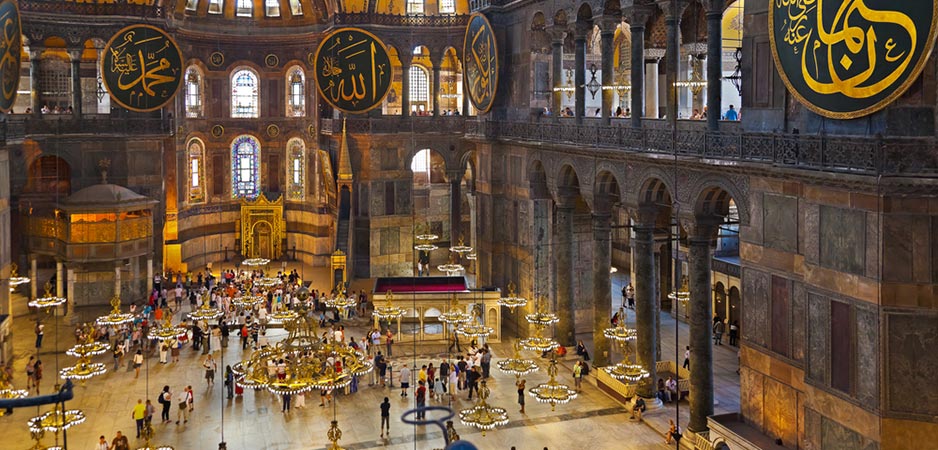On July 10, Turkish President Tayyip Erdogan issued a decree reconverting the Hagia Sophia museum into a mosque, thus realizing a long-cherished dream of conservative currents in Turkish society. Originally built as a cathedral by the Romans, the Hagia Sophia functioned as Istanbul’s main mosque throughout the Ottoman era. Its conversion into a museum in 1934 was one of a series of moves intended to distance Mustafa Kemal Ataturk’s new secular republic from the Islamic heritage of the defunct Ottoman Empire — and became a totem of conservative resentment toward the Kemalist regime.
Why Making Hagia Sophia a Mosque Again Is Good News
The reconversion of Hagia Sophia should, therefore, be considered a significant symbolic achievement for the conservative side and a settling of scores with the early republican period. Erdogan is also seeking political gain by treating this issue as an identity battle between conservatives and secularists.
A Tactical Move?
According to a poll conducted in June by MetroPOLL, a majority of the Turkish population regard the Hagia Sophia controversy as an attempt by the government to divert attention from economic problems and reverse its declining support. Only 30% said they felt it was really just about a change of use from a museum to a mosque. This means that even among supporters of the ruling Justice and Development Party (AKP) and its ultranationalist junior partner, the Nationalist Movement Party (MHP), significant numbers consider the move to be more tactical than ideological — even if they ultimately agree with the outcome.
Erdogan’s earlier statements also suggest that this is a tactical move. During campaigning for the local election in 2019, he responded angrily to a crowd that raised the topic of Hagia Sophia, pointing out that the adjacent Sultan Ahmad Mosque (Blue Mosque) is almost always empty during prayer times. He told his audience that he would consider reconverting the Hagia Sophia if they first filled the Sultan Ahmed Mosque. Given that this was consistent with previous remarks and little has changed since the exchange, political expediency now seems to have outweighed religious or ideological considerations. Erdogan expects reconversion to produce three political benefits.
Erdogan’s Political Expectations
The first benefit is to energize the more conservative segments of his power base by meeting one of their longstanding symbolic demands, in particular in light of the emergence of two splinter parties from the AKP, with the potential to appeal to this electorate. The prominence of the controversy suggests he has succeeded in this.
The second benefit would be to distract the public from the country’s serious socioeconomic problems. Where the youth unemployment rate — including those who have given up seeking work — has reached 24.6%, the government would like to talk about anything but the economy. Here, Erdogan has gained relief, but probably not to the extent he hoped.
The third and most important benefit would be to establish yet another identity battle between conservatives and secularists. This is the arena where Erdogan feels most secure, and the Hagia Sophia issue appeared ideally suited for the AKP’s identity wars. Its symbolism is multi-layered.
First of all, a fight over mosque versus museum slots easily into a religion/modernity binary. It can also be used to create an Islam/Christianity binary as Hagia Sophia was originally built as a church and functioned as such for nine centuries until the Ottoman conquest of Istanbul. Secondly, it awakens historical allusions and underlines the real or perceived dichotomy between the Ottoman Empire and the Republic. Reversing a decision taken by Ataturk also inflames existing debates over the early republican reforms. Finally, the move is also expected to provoke adverse international reactions, thus offering a perfect opportunity for Erdogan to breathe new life into his narrative of Turkey encircled by enemies, with Western powers subverting its sovereignty.
Domestically, Erdogan would expect the reconversion to provoke uproar among secularist circles and lead the secularist People’s Republican Party (CHP) in particular to condemn the decision and mobilize public opposition. This would create another opportunity for him to stir the “culture wars.”
In fact, however, the CHP and most of the other opposition parties avoided this ploy and either supported the reconversion or remained neutral. This approach is in line with the new strategy of CHP leader Kemal Kilicdaroglu, who has been careful to avoid such traps in recent years. While he has received much criticism from his party base — especially the secularist intelligentsia — for his calculated lack of interest in cultural conflicts, Kilicdaroglu seems to have been successful in preventing Erdogan from picking his fights.
In light of the lack of domestic push-back, the Turkish president will focus on international condemnation to fan the flames of identity conflicts, presenting these reactions as interference in Turkey’s internal affairs — if not outright Islamophobia. Given that certain European countries have their own problems with accommodating Muslim places of worship, European criticisms can easily be framed as hypocritical and anti-Islamic.
In that sense, Hagia Sophia is the perfect fight for Erdogan: it is symbolic, emotionally charged, politically polarizing and consolidates political camps. And all this is achieved with scant real-life consequences. European policymakers should follow the example set by the opposition parties in Turkey and deny Erdogan the trivial rhetorical fights he clearly seeks.
*[The German Institute for International and Security Affairs (SWP) advises the German government and Bundestag on all questions related to foreign and security policy. An earlier version of this article was first published on the SWP website.]
The views expressed in this article are the author’s own and do not necessarily reflect Fair Observer’s editorial policy.
Support Fair Observer
We rely on your support for our independence, diversity and quality.
For more than 10 years, Fair Observer has been free, fair and independent. No billionaire owns us, no advertisers control us. We are a reader-supported nonprofit. Unlike many other publications, we keep our content free for readers regardless of where they live or whether they can afford to pay. We have no paywalls and no ads.
In the post-truth era of fake news, echo chambers and filter bubbles, we publish a plurality of perspectives from around the world. Anyone can publish with us, but everyone goes through a rigorous editorial process. So, you get fact-checked, well-reasoned content instead of noise.
We publish 2,500+ voices from 90+ countries. We also conduct education and training programs
on subjects ranging from digital media and journalism to writing and critical thinking. This
doesn’t come cheap. Servers, editors, trainers and web developers cost
money.
Please consider supporting us on a regular basis as a recurring donor or a
sustaining member.
Will you support FO’s journalism?
We rely on your support for our independence, diversity and quality.






